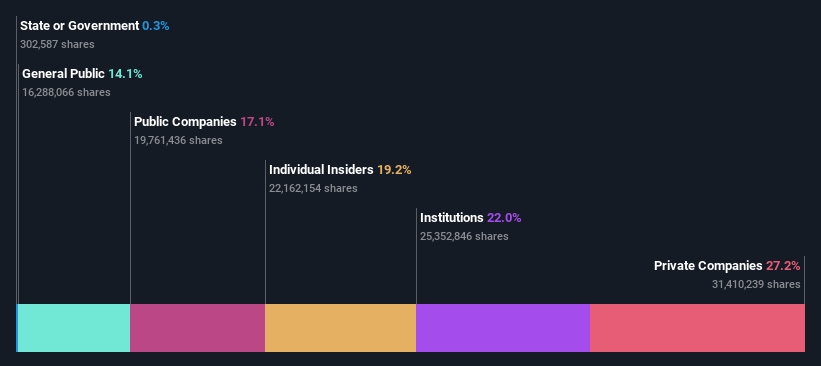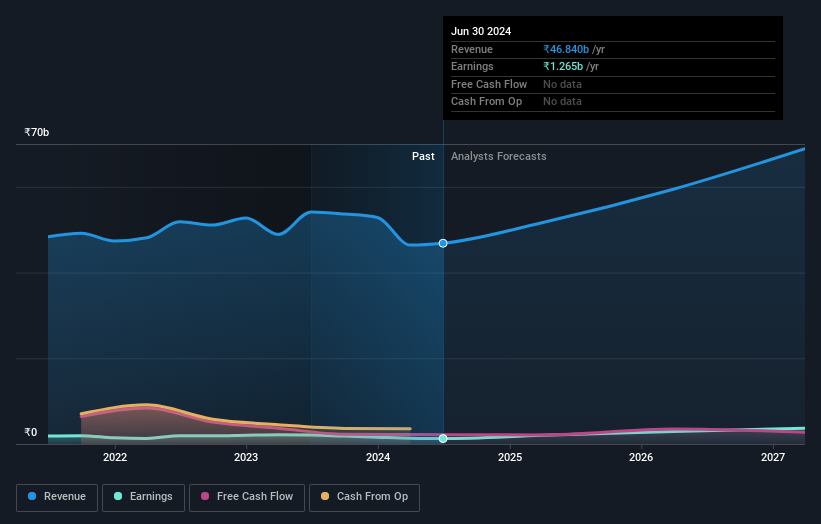- India
- /
- Consumer Durables
- /
- NSEI:BAJAJELEC
Private companies who hold 27% of Bajaj Electricals Limited (NSE:BAJAJELEC) gained 5.6%, institutions profited as well
Key Insights
- Significant control over Bajaj Electricals by private companies implies that the general public has more power to influence management and governance-related decisions
- 55% of the business is held by the top 4 shareholders
- Insiders have been selling lately
If you want to know who really controls Bajaj Electricals Limited (NSE:BAJAJELEC), then you'll have to look at the makeup of its share registry. The group holding the most number of shares in the company, around 27% to be precise, is private companies. Put another way, the group faces the maximum upside potential (or downside risk).
While private companies were the group that reaped the most benefits after last week’s 5.6% price gain, institutions also received a 22% cut.
Let's delve deeper into each type of owner of Bajaj Electricals, beginning with the chart below.
Check out our latest analysis for Bajaj Electricals

What Does The Institutional Ownership Tell Us About Bajaj Electricals?
Institutions typically measure themselves against a benchmark when reporting to their own investors, so they often become more enthusiastic about a stock once it's included in a major index. We would expect most companies to have some institutions on the register, especially if they are growing.
Bajaj Electricals already has institutions on the share registry. Indeed, they own a respectable stake in the company. This implies the analysts working for those institutions have looked at the stock and they like it. But just like anyone else, they could be wrong. When multiple institutions own a stock, there's always a risk that they are in a 'crowded trade'. When such a trade goes wrong, multiple parties may compete to sell stock fast. This risk is higher in a company without a history of growth. You can see Bajaj Electricals' historic earnings and revenue below, but keep in mind there's always more to the story.

Bajaj Electricals is not owned by hedge funds. Bajaj Sevashram Pvt. Ltd. is currently the company's largest shareholder with 20% of shares outstanding. For context, the second largest shareholder holds about 17% of the shares outstanding, followed by an ownership of 9.4% by the third-largest shareholder.
To make our study more interesting, we found that the top 4 shareholders control more than half of the company which implies that this group has considerable sway over the company's decision-making.
Researching institutional ownership is a good way to gauge and filter a stock's expected performance. The same can be achieved by studying analyst sentiments. Quite a few analysts cover the stock, so you could look into forecast growth quite easily.
Insider Ownership Of Bajaj Electricals
The definition of an insider can differ slightly between different countries, but members of the board of directors always count. Management ultimately answers to the board. However, it is not uncommon for managers to be executive board members, especially if they are a founder or the CEO.
Most consider insider ownership a positive because it can indicate the board is well aligned with other shareholders. However, on some occasions too much power is concentrated within this group.
Our most recent data indicates that insiders own a reasonable proportion of Bajaj Electricals Limited. It has a market capitalization of just ₹106b, and insiders have ₹20b worth of shares in their own names. That's quite significant. Most would say this shows a good degree of alignment with shareholders, especially in a company of this size. You can click here to see if those insiders have been buying or selling.
General Public Ownership
The general public, who are usually individual investors, hold a 14% stake in Bajaj Electricals. While this size of ownership may not be enough to sway a policy decision in their favour, they can still make a collective impact on company policies.
Private Company Ownership
We can see that Private Companies own 27%, of the shares on issue. Private companies may be related parties. Sometimes insiders have an interest in a public company through a holding in a private company, rather than in their own capacity as an individual. While it's hard to draw any broad stroke conclusions, it is worth noting as an area for further research.
Public Company Ownership
Public companies currently own 17% of Bajaj Electricals stock. This may be a strategic interest and the two companies may have related business interests. It could be that they have de-merged. This holding is probably worth investigating further.
Next Steps:
It's always worth thinking about the different groups who own shares in a company. But to understand Bajaj Electricals better, we need to consider many other factors. To that end, you should be aware of the 4 warning signs we've spotted with Bajaj Electricals .
Ultimately the future is most important. You can access this free report on analyst forecasts for the company.
NB: Figures in this article are calculated using data from the last twelve months, which refer to the 12-month period ending on the last date of the month the financial statement is dated. This may not be consistent with full year annual report figures.
Valuation is complex, but we're here to simplify it.
Discover if Bajaj Electricals might be undervalued or overvalued with our detailed analysis, featuring fair value estimates, potential risks, dividends, insider trades, and its financial condition.
Access Free AnalysisHave feedback on this article? Concerned about the content? Get in touch with us directly. Alternatively, email editorial-team (at) simplywallst.com.
This article by Simply Wall St is general in nature. We provide commentary based on historical data and analyst forecasts only using an unbiased methodology and our articles are not intended to be financial advice. It does not constitute a recommendation to buy or sell any stock, and does not take account of your objectives, or your financial situation. We aim to bring you long-term focused analysis driven by fundamental data. Note that our analysis may not factor in the latest price-sensitive company announcements or qualitative material. Simply Wall St has no position in any stocks mentioned.
About NSEI:BAJAJELEC
Bajaj Electricals
Engages in the provision of consumer products and lighting solutions in India.
Excellent balance sheet with reasonable growth potential and pays a dividend.
Market Insights
Community Narratives



